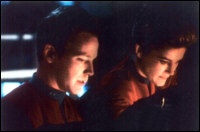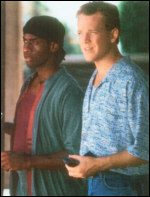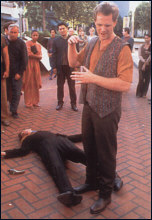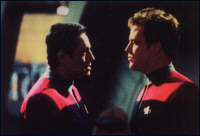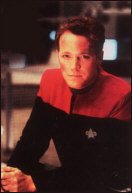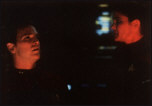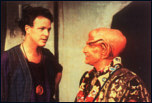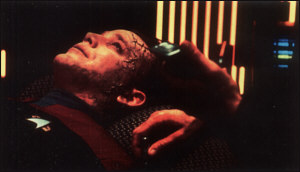| Robert
Duncan McNeill- Lt. Tom Paris
By Ian Spelling and Joe Nazzaro 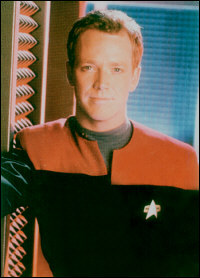
Many things
have changed for Robert Duncan McNeill since he first stepped onto the
STAR
TREK: VOYAGER sets nearly three years ago. Things have changed for
McNeill as an actor and for Tom Paris, the character he plays on the show.
Things have also changed behind the camera, as McNeill recently followed
in the footsteps of such STAR TREK predecessors as Jonathan Frakes,
Levar Burton, Avery Brooks and Rene Auberjonois in making the transition
from actor to director.
"That's a lot
of ground to cover in so short a time," notes McNeill. ,,Robert Beltran
and l were talking the other day. I said to him, 'I feel like I've come
full circle as an actor on the show.' I tended to do a lot of very realistic,
modern, naturalistic kinds of work before STAR TREK-contemporary
shows. On STAR TREK,
with the fantasy element and all of these special
effects, sometimes you get carried away in an acting style where you experiment
with the acting and don't trust that playing it naturally will be enough.
So, you tend to try to help it. There was a time where we all might have
been guilty of this as actors. I think all of us realized, especially this
season, that the best thing for the show is for us to just trust the material
and play it as honestly and realistically as we can.
"Even in those
moments when there are aliens and spaceships flying around, we really have
to focus on the simple honesty of how to play those moments. That's what
works best. We've all made an effort this third season to do that, to really
give some grounded performances and not play into the theatrical quality
of this show. I think that's what made STAR TREK: THE NEXT GENERATION
a
success. The actors almost underplayed, sometimes, the theatrical quality.
That, in a way, made it all the more believable."
McNeill was
none too pleased with all the character jockeying and let his feelings
be known to executive producer Jeri Taylor. "My nature is to let the writers
do what they want to do and stick to my Job. They established
a really interesting character in the pilot and then they were afraid to
develop all of the things that were interesting and flawed about him. The
fact that he was a ladies man was something they established, but then
they got afraid of it. They didn't want to insult the female audience and
they wanted to have a real Starfleet, romantic hero. but then I only had
one real romantic interest in three seasons. The Doctor has had three or
four. They got very afraid of some of these qualities they introduced in
Paris. I think they emphasized the negative aspects of his rebellious side.
What's positive in that is that he's somebody who thinks for himself. His
being creative, being able to think for himself and being willing to break
the rules can help him solve problems. That's something they never quite
got, that the loose cannon quality can sometimes be an asset. Now, this
season, they're trying to show that a little more. They're making their
strongest attempt so far to really develop this character.
Fans may also
have noticed that season three of STAR TREK: VOYAGER has brought
with it far more humor than has been seen before. Yes, the crew is still
thousands of years from home. But, no, they aren't constantly bemoaning
their fate, as they did in episodes past. Gone, too, is much of the earnestness
and seriousness on view during seasons one and two. Now, in fact, it's
not unusual to hear Janeway, Kim or even Tuvok make a wry, dry observation.
McNeill points
to Q's latest adventure, ,"The Q and the Grey," as a case in point. ,,Q
obviously has a history of being a very funny character, but they allowed
all of us to have a few of the same sort of moments Q has all the time,"
notes McNeill. "We all got to deliver a few comic lines. There has also
been a change in attitude that the producers have asked us to keep in mind,
and that's to embrace this adventure we're on. We've stopped showing the
audience how much we want to get home. One thing that
hasn't changed much about STAR TREK: VOYAGER is the fun that the
cast has off-camera. The actors are a tightknit bunch and seem to genuinely
enjoy each other's company. No one takes themselves very seriously and
it makes for a rather laugh-filled set. ,,It helps a lot," says McNeill.
,,In fact, that's what Jonathan, LeVar and some of the other actors we've
met from
Among the on-screen
relationships between Tom Paris and the rest of the crew, there's n question
that the one most often and most deeply explored has been that with Harry
Kim. They were established as instant friends in "The Caretaker" pilot
and have continued to be pals. "They've really expanded that relationship.
We've seen Paris and Kim have same fun and we've seen them in action together
in episodes like "The Chute," when things got serious. That's good," McNeill
enthuses. ,,There are some other relationships that have never really been
explored enough, in my opinion. One thing that's going to happen this season;
at least it has been mentioned to me that they want to do
this, is there may be a relationship between Paris and B'Elanna. They're
both strongwilled people and it would be great to create a little sexual
tension there. We're not exactly sure what will develop out of it, but
there's definitely a little flirtation going an.
"Don't you
think that would make a very interesting romance, Paris and B'Elanna? I
never thought the Kes thing was right. It made Paris look really bad, flirting
with Kes. Luckily, last season they really cleared that up and dropped
it so Neelix and Paris could became the odd couple. I would love to do
more episodes with Neelix. Tom Paris and Neelix are a great odd couple,
and Ethan Phillips and I get along so well. We have so much fun together
that would love to do more episodes with him."
McNeill may
very well get the chance to make that happen one day and, if he's lucky,
he might even get to direct one or two more episodes. The actor became
the first
STAR TREK: VOYAGER cast member to direct an episode when
he helmed ,"Sacred Ground." That show, in which Janeway tried to save Kes
after the Ocampa entered a Nechani shrine and was hit by a bolt of energy,
was actually lensed late in the second season and held over until season
three. McNeill recalls that one of the first things Clearly, McNeill
wanted to direct. "I did, but it's a hard, hard nut to crack, going from
actor to director. It's hard to get that first break. I let Rick know right
away that I wanted to do it," he says. Time passed. The first season of
STAR
TREK: VOYAGER
ended and McNeill was not tapped to direct. Apparently,
Berman wanted McNeill to grow more familiar with his character, with the
inner workings of a
STAR TREK series, with every nook and cranny
of the show's sets. One weekend day during the series' second season, while
McNeill was attending a convention, the actor received a message while
checking out of a hotel: "Call your wife! Emergency!"
McNeill's wife
explained that Berman had called that morning and wanted McNeill to phone
him at home as soon as possible. Mrs. McNeill was agitated. She thought
for sure that Berman had called to inform her husband he had been fired.
,"She said, 'Why would he call on a weekend unless there's something really
wrong?' I said, 'OK, don't worry. I'll call him now and I'll call you right
back.' So, I did," he remembers with a laugh. ",Rick said some things in
scheduling had gotten a little screwy and there was a directing slot available
in two weeks, was I ready to start? I said, Absolutely.' I didn't have
much time to get nervous."
Since beaming
aboard VOYAGER,
McNeill has closely watched the directors who've
put him through his paces, especially those, like Frakes and Burton, who
are actor/directors. ,Jonathan was a wonderful inspiration. I kind of amalgamated
a number of directors from our show. Many people said, "Oh, you're just
like Jonathan. In same ways, yes, 1 am," he agrees. In other ways, though,
Jonathan and 1 are very different. He's a kind of performer when he's directIng.
He keeps everyone laughing an the set. There's a real high energy level
with Jonathan directing. My personality tends to lean more toward LeVar's,
maybe. When LeVar directs, there's a little more quiet an the set. Maybe
it was because I was quite nervous during my first show, hut I wasn't running
around laughing and joking.
"Anyway," continues
McNeill, McNeill reports
that he also picked up a few lessons about acting while directing. ,,As
an actor, you learn to attack a script from a very individual character
point-of-view. I look at a script and say ,'OK, here's the story, hut how
do I portray Tom Paris' point-of view here?' That's usually my focus. What
I've been learning is how to read a script from a different perspective,
to step back and read it first as an audience member and watching everybody's
point-of-view, and then as a storyteller. How can I go in there and visually
tell this story? How can I let the camera assist me in telling this story,
rather than just setting it on a tripod, turning it on and saying, 'Go!'
The amount of assistance a camera can give you is immense. You can use
the movement of the camera, the different lenses and types as photography
to tell the story. And that's what I've been learning." Ultimately,
McNeill got the episode he hoped to get. "I'm really happy with it," he
asserts. ,"Everybody contributed. I tried to incorporate everyone's ideas.
It's the kind of episode that's very much a thinking person's, moody piece.
It's not a big shoot ,em up. It's a story of ideas, of feelings, of character
journeys. It was wonderful for me to have that as the first episode because
I got to focus on the actors. My next show is the one that introduces the
Borg, the ones you saw in STAR TREK: FIRST CONTACT to our show.
It's a different challenge to direct an action piece."
What with his
getting to direct at least one and perhaps two more episodes this season,
and with all the alterations in the show, Robert Duncan McNeill couldn't
feel more positive about STAR TREK: VOYAGFR these days. "Everybody
is very excited and sort of re- energized. We've made some really good
improvements.
THE NEXT GENERATION and DEEP SPACE NINE both
took a couple of seasons to get going. And we're not unique in that way.
We had a real good premise, but it bas taken us a couple of seasons to
find our own distinct way, which we have now. We're really good now and
I think you'll see that we're all going to get better and better."
"Ex Post Facto"
"Investigations"
"Parturition"
"Threshold"
"The Chute"
and ,"The Swarm"
"Future's End"
Robbie's on
the cover! See
image.
Taken from the Star Trek Voyager Magazine Issue 11, April 1997. |
